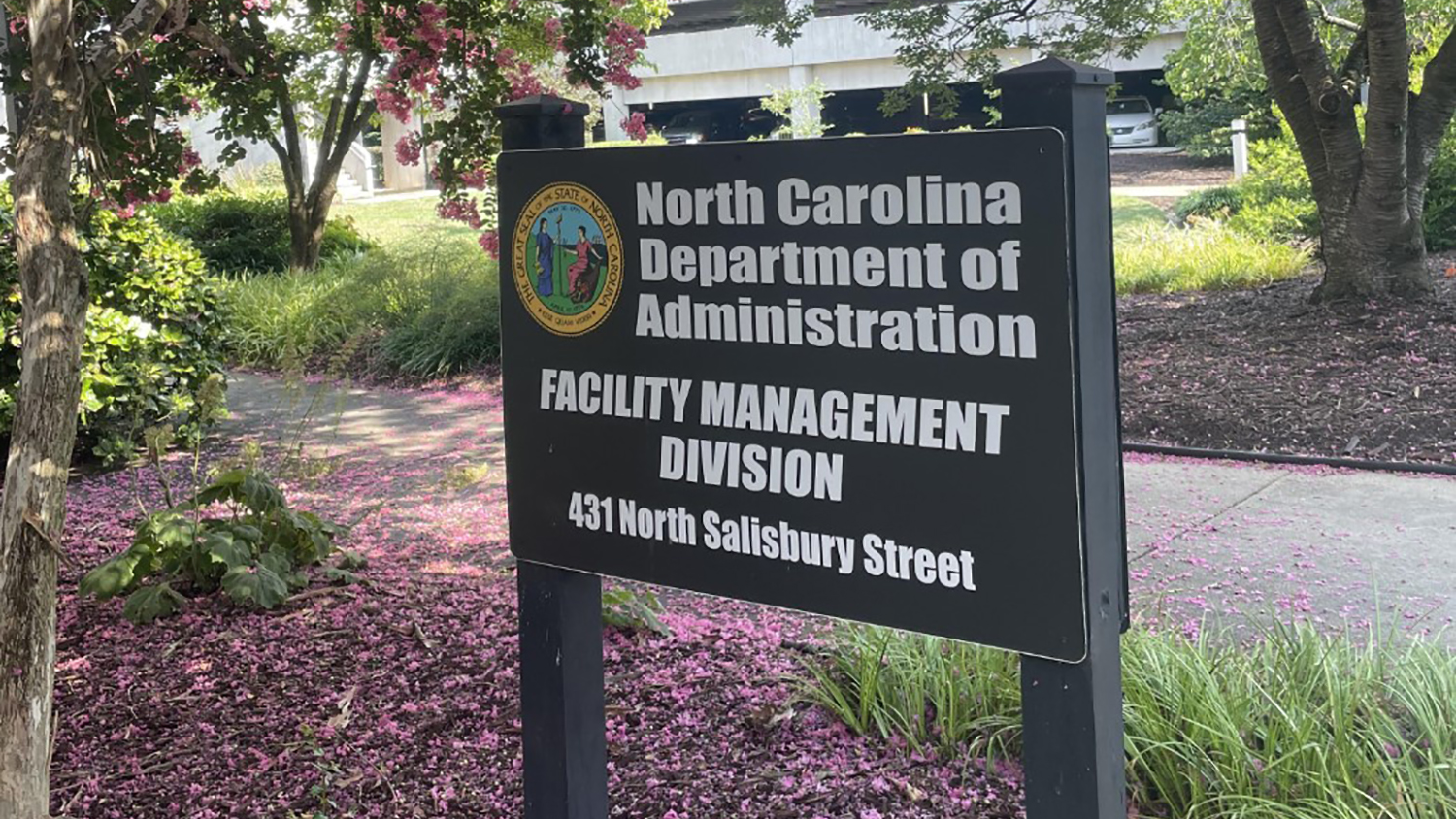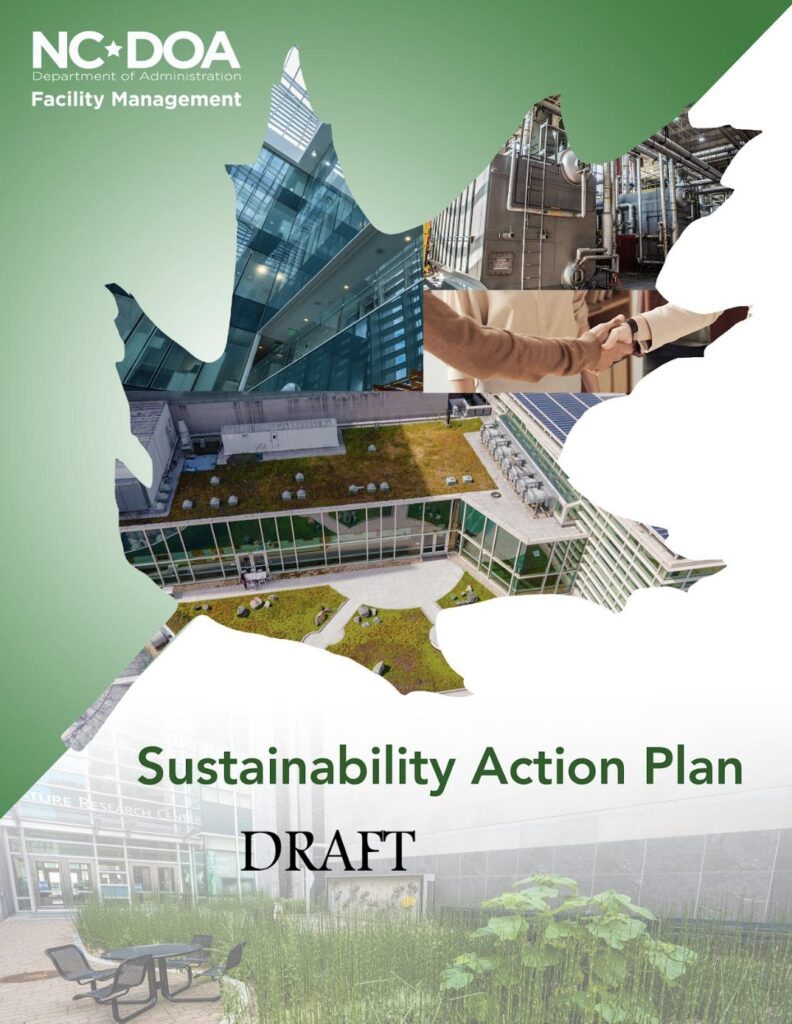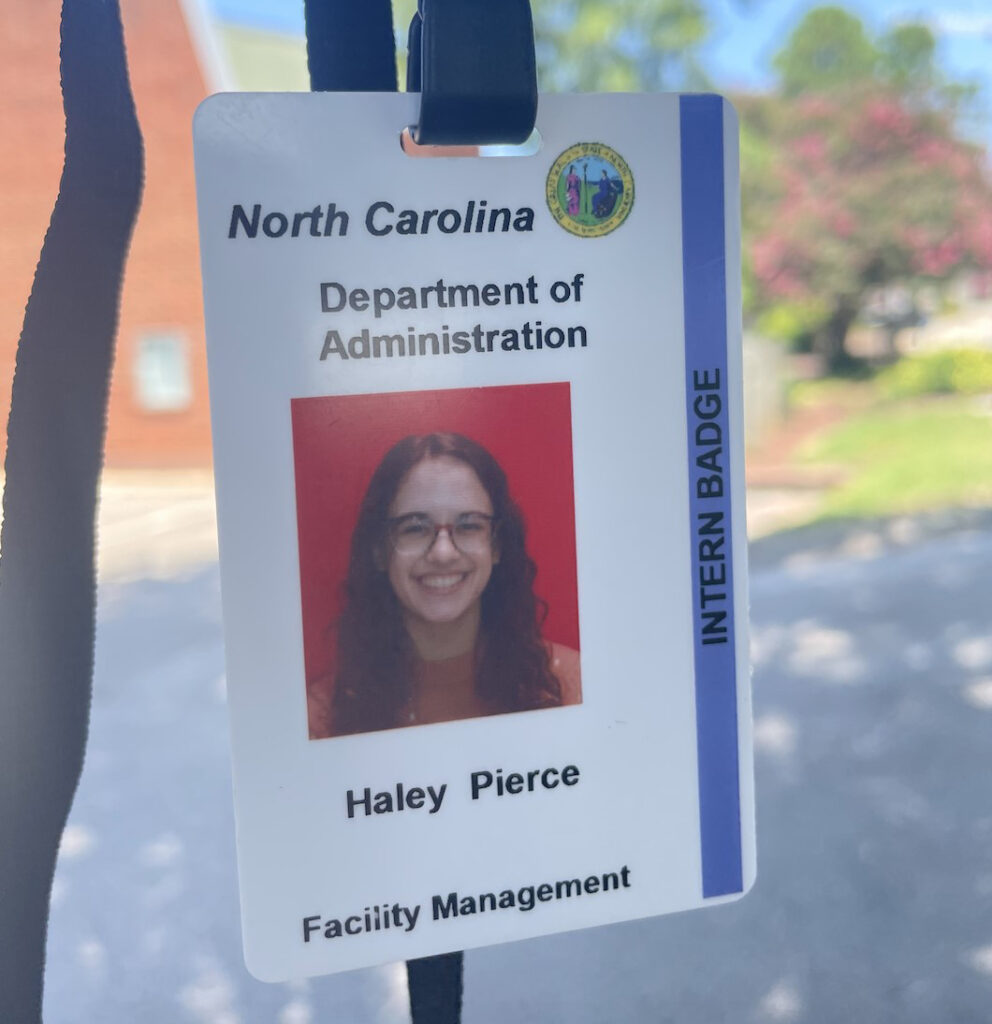Haley Pierce: Sustainability with State Government

The stress of the summer internship hunt is real, but throughout the process, I kept hearing from friends, it’ll all work out the way it’s supposed to. In my professional opinion, those are pretty good words to live by.
This summer, I was hired as the sustainability intern for the Facility Management Division of the NC Department of Administration. Wordy, yes, but if there’s anything I learned about state government during my ten weeks with the State of NC internship program (which I’ll talk a little more about later), it’s that they love their acronyms. So I get to use an entire quarter of the alphabet and say I was lucky enough to work with NCDOA’s FMD.
Well, I learned a lot more about state government than that. One of the first things that my supervisor, Brittany Quinn, discussed was that everything is sustainability. A lot of folks in state government and beyond are already doing sustainability work; they just don’t realize it yet. Making cost-efficient updates, strengthening a workplace community, housekeeping work—all of that falls under the umbrella of creating an environment that will last. The word sustainability may seem intimidating at first, but when people realize that they’re already working with a sustainability mindset, a culture change towards consciously implementing sustainability initiatives is easier to reach.
FMD maintains state-owned buildings around Raleigh. One of my tasks was to consolidate, upload, and analyze building electricity and water data. This helped me and my supervisor determine how far along NCDOA is in reaching a goal of 40% energy reduction from a 2002-2003 baseline by 2025, and we also brainstormed and calculated savings for energy efficiency initiatives that could help meet this goal. I also helped to pilot new recycling signs in my building and another, and create standard operating procedures for implementing the new bins/signs throughout NCDOA. I learned that energy managers love the phrase “low-hanging fruit”, which has been permanently added to my vocabulary.

One of my favorite tasks was working on FMD’s Sustainability Action Plan (another acronym for you: SAP). I’m a big proponent of Google Docs, and after using Word for a whole summer, I think I’ll stand by it. But despite the occasional formatting frustrations, I really loved getting to compile the SAP with my supervisor. We asked ourselves…what really needs to be included in a living document used for sustainability reporting and exploration? So we pulled information from the original draft, went through FMD’s completed and planned sustainability projects, developed an updated list of goals, created new content, and made it look nice. It’s exciting to see that our work has become a complete, comprehensive draft.
One of the most exciting parts of my internship was designing my own project. The sky was the limit in this realm of the internship, and my idea came to me when I was exploring the original SAP draft and it was noted that there was no organic waste diversion program for NCDOA. This led me to wonder if I could create one. So I planned to host a small pilot program at my building and its associated shops, with the goal of collecting both organic waste and information that I could use to outline a larger pilot program for other NCDOA buildings. I also thought it would be neat to add to my project by writing standard operating procedures for what zero waste events at NCDOA could look like. I collected my materials, designated an area in my backyard to sort and evaluate the waste, made flyers and signs and emails, and spread the word.
In all honesty, I was nervous about this project. I compiled information from anywhere I could—attending the Appalachian State Energy Summit, research papers, blog posts, emailing and chatting with people. But none of that preparation overshadowed the fact that I’d never overseen a pilot (a micropilot, as I started to call mine), and it felt like I was putting myself out there, unsure if anyone would participate. I told myself that even if my micropilot failed, I’d still learn enough to outline a DOA pilot program with a stronger focus on composting communications.
Overall, it was awesome to see my project come to life, from those first hesitant bullet points to outlining a plan to solidifying that plan and creating something comprehensive, actionable, doable (DOAble if we want to go for the pun).
I repurposed bins from various places within my building, and decided to collect both food waste from break rooms and paper towels from my building’s bathrooms. During the week of the pilot, I collected compost every morning from the shops buildings (HVAC, plumbing, electrical, and landscaping) and every afternoon from the FMD building. Then, I would weigh the compost, take it to my backyard pile, and evaluate the materials, contamination rates, and carbon/nitrogen ratios. The weights I collected exceeded my expectations, thanks in part to a beautiful, coffee-ground covered watermelon rind from the HVAC shop. The thing weighed over four pounds, a testament to the fact that food waste can be an extremely heavy part of the waste stream, one reason why composting should be the standard. Overall, I collected 16.3 pounds during the week. I valued the conversations I had with people as I moved around my office and went out to collect compost, especially when they showed me that my efforts were visible. I led a meeting to present my findings and discussed with participants what they’d want to see in a permanent composting program. They had great ideas!
The next step—creating a workable document outlining a composting program other NCDOA buildings could use. Two weeks and seventeen pages later, my document contained two paths forward for composting and information about its importance, communications, potential challenges, and more. Getting to enact a tangible sustainability project was an incredible, enjoyable lesson in project management.

As I mentioned previously, this internship was a part of the State of NC internship program, which hires students from all over the state to work in a variety of departments on a diverse range of projects and issues. The program exposes us to careers in state government and helps us get hands-on workforce and professional experiences. Outside of my work with FMD, I got to participate in State of NC intern events and meet the other interns. We participated in a discussion about social media, did a scavenger hunt at the Museum of Natural Science, visited the Queen Anne’s Revenge conservation lab at ECU, and more! I also attended the first Governor’s Office and NCDOA Gen Z Policy Forum, where five participants presented and led discussions of policy proposals in the areas of criminal justice, sustainability, medicine, and social media. At the end of the ten weeks, the interns gathered at the Governor’s Mansion for a culminating reception—Governor Roy Cooper gave a speech, and the interns spent some time enjoying the community we’d built.
Now that my time with the State of NC internship program has come and gone, my next step is to take the project management skills I learned during my sustainability internship to my new position with NC State Dining as their sustainability marketing intern. I’ve already made connections like brainstorming sustainability ideas and digging more into how composting relates to dining’s sustainability initiatives. Though I’m still figuring out the best route for me post-graduation, which may include grad school after a few years of work, I know I want to have an impact on the important intersections between food systems and climate change. My time at Facility Management and the connections I made throughout my internship reinforced this value and are definitely leading me down the right path.